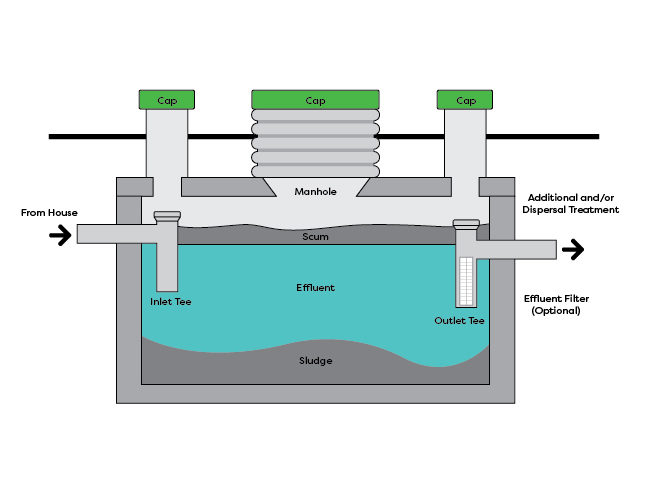Ready To Buy a Home?
Get Approved to Buy a Home
Rocket Mortgage® lets you get to house hunting sooner.
If you’re a rural home buyer, one thing to keep in mind is whether the house has a septic tank. A septic tank is an on-site wastewater treatment system. It’s how a home processes and disposes of wastewater without being connected to a municipal sewer system. A septic tank doesn’t need to be a dealbreaker, but there are a few things you’ll want to know before bidding on a home with one. Let’s take a look.
How Do Septic Tank Systems Work?
Most septic tanks are made of concrete, fiberglass or polyethylene. They’re typically buried underground near the home and are shaped like a cylinder or rectangle. Wastewater treatment takes place inside the septic tank, which is designed to separate solids and liquids using a simple process that relies largely on gravity.
If you’ve ever spent time in rural areas, you may have noticed a surprising number of people have a similar-shaped hill in their yard. While these could be naturally occuring, or incognito bunker systems, they’re more likely to be septic tanks.
As wastewater flows into the tank, the solids settle and build up to form a sludge at the bottom of the tank. The middle layer is mostly composed of water and some light solids, known as effluent. The heaviest layer, made up of oils and grease, floats to the top and forms a scum layer.

This separation is important because each layer needs to be treated differently. The sludge at the bottom must be removed periodically by a professional, but the other layers can be left alone.
Over time, some of the water in the effluent seeps out of the tank and into the soil. The soil acts as a natural filter, cleaning the water before it eventually reaches groundwater supplies. This entire process happens without the use of any electricity or additives, making septic tanks an eco-friendly method of sewage treatment.
Pros and Cons of Buying a House With a Septic Tank
If you’re unfamiliar with septic tanks, it’ll be helpful to consider the positives and negatives of buying a house with a septic tank.
PROS of Septic Tanks👍
One benefit of owning a home with a septic tank is that you don’t have to pay a monthly utility bill for wastewater treatment. While you’ll still need to maintain the system, this could be significant savings in the long run.
Generally – since they aren’t benefiting from numerous city services – properties that are outside of the city limits and connected to a septic tank tend to have lower property taxes than those within city limits.
When you don’t have to rely on public utilities, you get to ensure proper maintenance of the system.
When functioning properly, septic tanks are quite environmentally friendly. Wastewater is treated on-site and doesn’t require additional energy to transport it to a centralized treatment facility.
With proper maintenance and regular cleaning, most septic tanks will last for 20 – 40 years.
CONS of Septic Tanks👎
While septic tanks don’t require too much maintenance, they do need to be pumped every 3 – 5 years and inspected every 3 years. These services typically cost $300 – $700. Fortunately, it’s a very hands-off process for the homeowner.[1]
Because septic tanks rely on natural bacteria to break down waste, it’s important to be mindful of what you put down the drain. Chemicals like bleach and drain cleaners can kill the bacteria and throw off the whole process.
If a septic tank isn’t properly maintained, it can lead to costly repairs. For example, if the tank overflows, it can contaminate the soil and groundwater and require significant cleanup.
If you plan to make any additions or changes to your home, it’s important to check with your local code regulations first. Septic tanks are more delicate than city sewer systems. So you may need additional requirements or permits before you can start construction.
Things To Consider Before Buying a House With a Septic Tank
Septic tanks have proven to be a suitable alternative to traditional municipal sewer systems. But there are a few things prospective buyers should keep in mind – especially if it’s unfamiliar territory.
Get a septic system inspection before move-in day
Just like you have a home inspected before buying a property, it’s also important to get a septic system inspection. This will give you an idea of the condition of the system and what, if any, repairs or maintenance may be needed.
Budget for regular maintenance
Septic tanks require regular maintenance and cleaning every 3 – 5 years. Factor this into your budget so you’re not caught off guard by the cost.
Learn your local laws
Before making any changes or additions to your home, check your local laws and regulations regarding septic tank systems. Having a septic system could put you on the hook for additional permits or requirements before starting any construction.
Any issues are your responsibility
Remember, if you’re the owner of a home with a septic tank system, any issues that arise are your responsibility. This includes things like overflow, contamination and repairs. Be sure you’re prepared to handle the financial and personal responsibility of any potential problems.
Can I Change From a Septic System?
If a septic system might be a deal breaker for your home buying plans, you might be wondering about your options. It’s possible to change from a septic system to city sewer – so long as your city’s public works department confirms there’s a city sewer line available to you. If one is available, the process isn’t as difficult as you might think.
Once you know connecting to a city sewer line is an option, you’ll need to obtain the necessary permits for the project. Keep in mind that even if the pipes are already in place, there are still fees involved in linking a house to a nearby system.
Next, it’s time to contact a reliable plumber who can make the connection between your home and the nearest sewer line. If you’re switching from a septic tank to a city sewer line, you’ll need to have your septic tank drained and either removed and crushed or filled in and reburied.
A Septic Solution That Doesn’t Stink
To the unfamiliar, septic tanks may seem like a hassle. But with a little know-how and proper maintenance, they’re easy to get used to. Septic tanks are a viable alternative to traditional municipal sewer systems, allowing for the comforts of living in a modern society even in more rural areas.
Frequently Asked Questions
Most septic tanks should be emptied every 3 – 5 years, depending on the tank’s size and the amount of wastewater it’s processing. Smaller tanks need to be emptied more frequently than larger ones. And if you have a lot of people living in your home, your tank will need to be emptied more often as well.
Septic tanks can become overwhelmed, causing wastewater to back up into the home or overflow into the yard. If you see this beginning to happen, it’s time to call a plumber and have your tank emptied. Other signs that your tank might need attention include slow drains, gurgling noises from the drain, water pooling on the property and a strong sewage smell.
No, the septic system is not related to the drinking water system in any way. The septic system handles wastewater from the home, while the drinking water system brings fresh water into the home. Home builders and plumbers are careful to keep these two systems separate to avoid contamination.
The answer to this question depends on the size and type of septic system you have. Generally, you can expect to spend around $400 per year on septic system maintenance. This includes having your tank emptied, making sure the tank is properly covered and repairing or replacing leach fields.
Septic systems are designed to process human waste and toilet paper. You should not put things like coffee grounds, cat litter, diapers, paper towels, feminine hygiene products, cigarette butts or cooking oil down your septic system, as they can cause clogging and other problems.
The worst-case scenario with a septic tank is that it overflows and dumps sewage onto your property. This can happen if the tank becomes full and is not emptied in a timely manner. It can also happen if there’s a problem with the leach field or if tree roots grow into the tank.
Take the first step toward buying a home.
Get approved. See what you qualify for. Start house hunting.
The Short Version
- A septic tank is an on-site wastewater treatment system. It's how a home processes and disposes of wastewater without being connected to a municipal sewer system
- One benefit of owning a home with a septic tank is that you don't have to pay a monthly utility bill for wastewater treatment
- Most septic tanks should be emptied every 3 – 5 years, depending on the tank’s size and the amount of wastewater it's processing
HomeAdvisor. “How Much Does Septic Tank Pumping Cost?” accessed September 2022 from https://www.homeadvisor.com/cost/plumbing/clean-septic-tank/




